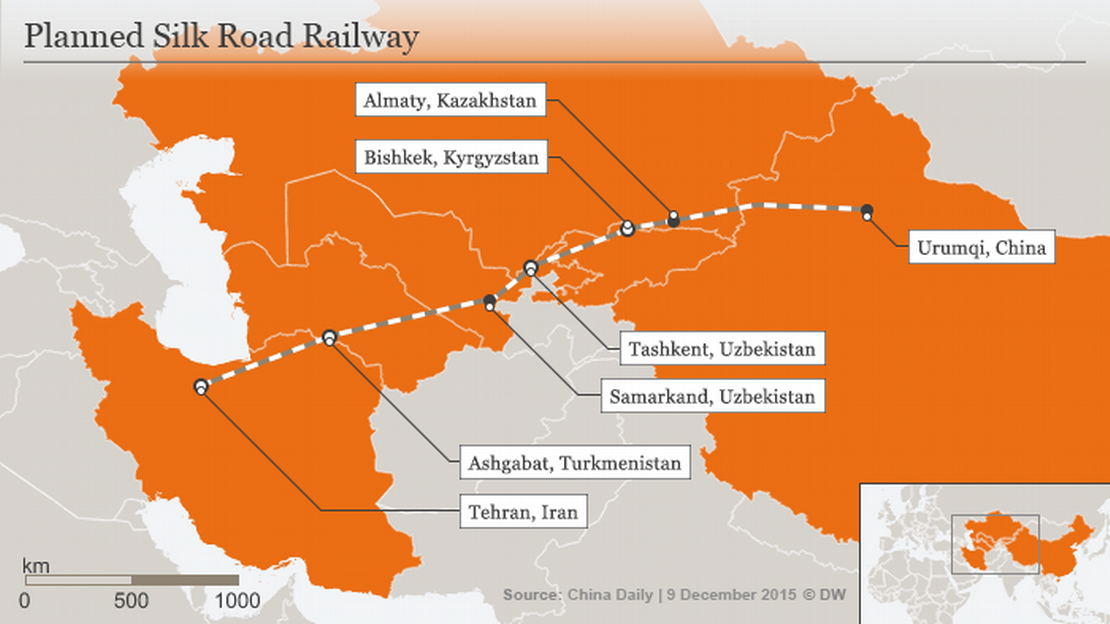Very few people in the ‘West’ have yet paid much attention to the very significant contribution that China has made, behind the scenes, to strengthening Iran’s resilience as well as its defensive and offensive military capabilities.
Several Western reporters have written (e.g., Reuters here) about China’s heavy degree of reliance on oil imports from Iran, and many of them have noted that this has made China very vulnerable to any closure of the Straits of Hormuz that could have been sparked by a continuation of the US-Israel war on Iran. But very few Western commentators have taken note of the fact that on May 24, a lengthy freight train carrying electronics and other goods arrived in Tehran, having inaugurated the first ever direct rail link between China and Iran.
Establishing this direct rail link is not the only way in which China has been bolstering Iran’s resilience and capabilities. Of probably even greater importance has been the ability Chinese tech has given many core parts of Iran’s governance and military command systems to free themselves from reliance on the kinds of Western tech that have left users often fatally vulnerable to US-Israeli hacking. As the well-placed Chinese tech expert William Huo noted earlier today, “Iran’s drones… fly coordinated, autonomous, and lethal. That’s Chinese targeting AI and optical systems… Iranian missiles run on Chinese chips, Chinese servos, Chinese nav units.”
He noted that in return, “China gets a combat-proven proxy and real-time telemetry from a U.S.-backed target. If Iron Dome can’t keep up, what happens in Taiwan? What happens to Aegis? To Japan’s missile net? Everyone watching saw the same thing… “
Small surprise, therefore, that earlier today, per Al-Monitor, “China hosted defence ministers from Iran and Russia for a meeting in its eastern seaside city of Qingdao…”
Huo and others have noted that much of the terminal guidance that made Iran’s most advanced missiles, and some of its drones, so effective in reaching precise targets inside Israel, was provided by systems using China’s Beidou navigation system (intriguingly often shortened to ‘BDS’.) Unlike systems reliant on the Western GPS system, BeiDou is not vulnerable to US/Israeli hacking or spoofing.
Evidently, some leading people in Iran’s security sector were still, as of June 13, using Western-based communications systems like WhatsApp or Telegram. Earlier this week, a Washington Post reporter was passed, by “an Israeli individual who obtained the material” an audio recording of a threat that an Israeli security-services operative had delivered over the phone to a “senior Iranian official” warning that he and his wife and family would be murdered unless he either fled Iran or made and sent back to them within 12 hours a video in which he dissociated himself from the Iranian government.
Almost certainly, going forward, all senior Iranian officials will be restricted to using non-Western means of communication.
China’s ability to have started building valuable, concrete operational relations with many parts of the Iranian military should come as little surprise. Back in March 2023, Chinese Foreign Minister Wang Yi stunned the whole of the Western world when he succeeded in brokering a reconciliation between Saudi Arabia and Iran that changed the geopolitics of the Gulf region and West Asia very substantially.
Prior to that reconciliation, it was an unquestioned assumption of most Western policymakers that the wealthy (and Sunni Muslim) rulers of the Arabian Peninsula coast of the Gulf more or less shared their desire to see the demise of the (Shi-ite-dominated) Islamic Republic of Iran. During the whole of the current US-Israeli attack against Iran, however, the Arab Gulf rulers of the GCC have largely stood aside from joining the anti-Tehran battles, though Qatar and many of the others do still host significant US military bases. At the June 22 meeting that the UN Security Council convened urgently to discuss the US-Israel-Iran crisis, the ambassador of Kuwait put his name on the speaker’s list and in the name of all members of GCC he decried the Israeli and US attacks on Iran and called urgently for a ceasefire.
On recent developments in China’s policies toward Palestine and West Asia more generally, here are two other intriguing sources:
- This piece by Zhang Sheng in Mondoweiss in March. (This tracks how, despite the PRC government’s fairly close economic ties with Israel some years ago, it has more recently distanced itself from it.
- English translations of the speech the Chinese rep at the UN made at the June 22 session, and comments by a Ministry of Foreign Affairs spox, also on June 22. Interestingly, the Ministry spox noted that Chinese bodies had worked to evacuate 3,125 Chinese nations from Iran during the war, while “China’s Embassy in Israel helped and organized the evacuation of over 500 Chinese nationals from Israel to safety, and helped some nationals from the UK, India and Poland safely evacuate.” So that is ratio of about 6 to 1.


